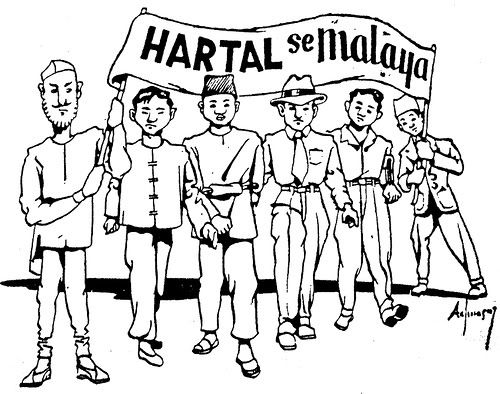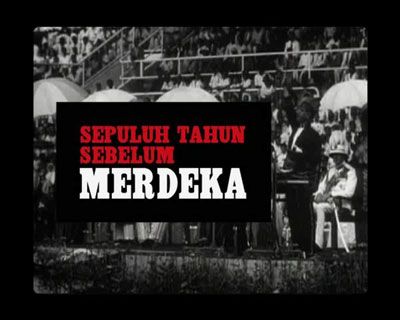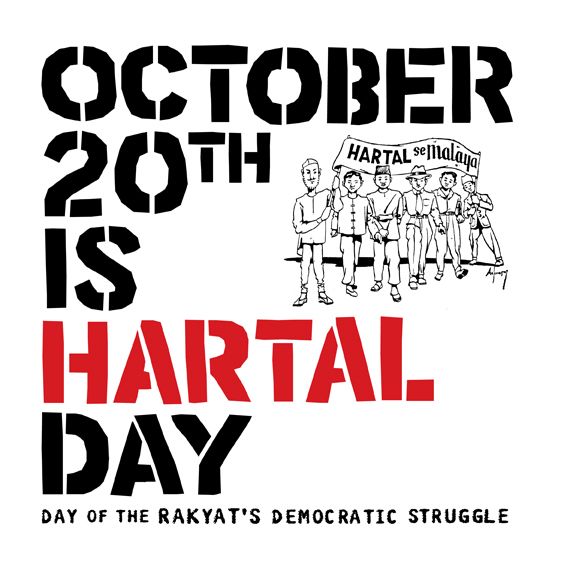Hartal: The day Malaya stood still
Technorati tags: History, Hartal, Civil Disobedience, Mass Strike, Hari Hartal, October 20, 1947
Today marks the 60th anniversary of an important pivotal point in our nation's history. But it's not one of those events that is usally mentioned or glorified as part of our "official" historical retelling of Malaya's road to independence. As is often stated, history is written by the victors.
 A mass strike unlike any other this nation's seen
A mass strike unlike any other this nation's seen
(image taken from the Sepuluh Tahun Sebelum Merdeka blog)
October 20th, 1947 - sixty years ago today, Malaya virtually stopped in its tracks. Hartal - when the nation literally shut down during an unprecedented show of solidarity and protest.
Hartal - a term used in many Indian languages, meaning "strike action". It is a total shutdown of workplaces, shops, and businesses, and is a form of civil disobedience used often during the Indian independence movement.
(source: Wikipedia)
Brilliantly put together by young filmmaker Fahmi Reza, "Sepuluh Tahun Sebelum Merdeka" (Ten Years Before Independence) retells an alternate view of Malaya's struggle for independence, seen through the eyes of 5 individuals (now well in their 80's) directly involved with the political organizations that made up PUTERA-AMCJA, a multi-racial coalition consisting of an alphabet soup of political movements at the time (see the end of the post for a list).
 Click image above to view film
Click image above to view film
(opens in a new window)
But it's an important film, breaking the hegemony of official history, giving those Walski's age and younger a glimpse into the other side of the UMNO/BN story-telling coin. What surprises Walski the most is that Fahmi is not even in his 30's yet. And that, to Walski, is heartening - that there is a yearning amongst the younger set to delve into history, and uncover the numerous untold stories.
And there are undoubtedly many of these stories.
Walski, while in school, never really had a passion for history (to his discredit) - he blames it on the rote learning emphasis of the when, who and where (but never delving deep enough into the why) that was prevalent in the teaching of history back then (perhaps now, still). Walski's interest in history is rather recent - fueled by a rebirth of his own yearning to know why some things are the way they are today - and history is perhaps the only possible avenue to find out why.
Produced with funding from the Konrad Adenauer Foundation, and debuting at the recent KOMAS 2007 Freedom Film Festival, "Sepuluh Tahun Sebelum Merdeka" can now be viewed online, for free (click on the second image above) on a few sites., accessible via the film's blog.
And it is a film that Walski feels is a must-see for all Malaysians concerned about where we came from, and more importantly, where we're headed.
(the film, the history, and more, in the full post)
 Trying to change the official narrative of a nation's history, however, is no easy task. Amir Muhammad having both his films banned is a case in point (Lelaki Komunis Terakhir, and Apa Khabar Orang Kampung, being the two films). It's not difficult to understand why, though.
Trying to change the official narrative of a nation's history, however, is no easy task. Amir Muhammad having both his films banned is a case in point (Lelaki Komunis Terakhir, and Apa Khabar Orang Kampung, being the two films). It's not difficult to understand why, though.
The official history of our struggle for independence from the British glorifies the role of UMNO and the Alliance, giving the impression that it was they alone that allowed for us to become an independent nation. But the real story is more complex, and Sepuluh Tahun perhaps sheds some light on a seemingly obscure event. Walski, to be perfectly honest, had not known about the Hartal prior to this.
In setting the stage for the actual Hartal event, Fahmi takes us through a period in history immediately after the Japanese occupation during the Second World War. Using interviews of the five individuals, it becomes apparent that there was bigger opposition to the UMNO-mooted Federal Constitution by the people at the time than the official retelling.
An alternative was drafted by PUTERA-AMCJA, a multi-racial coalition of political action left-wing parties of the day, and presented to the British administration then. The PUTERA-AMCJA coalition consisted of PUTERA (Pusat Tenaga Ra'ayat, or Center for People's Power) and AMCJA (All Malayan Council for Joint Action), each of which in themselves were coalition of Malay left-wing and non-Malay left-wing parties, respectively. As Walski indicated above, the overall coalition and the two sub-coalitions contained an alphabet soup of parties (see this book review from Malaysia-Today for context and details. A glossary is also provided at the end of this post).
But this alternate draft was pretty much rejected - worse, ignored - by the British administrators, who only chose to engage with UMNO. And it is this rejection that led to PUTERA-AMCJA taking a leaf from their contemporaries in India, and organizing the hartal 60 years ago today. The purpose was to show the British administrators the feelings of the people about their choice of engagement - that UMNO was not really speaking for the entire Malayan population.
The hartal, while successfully paralysing the nation for twelve hours on that day, was not enough to change the minds of the British. According to the film, 99% of businesses in the peninsular shut down that day. Instead, the repressive mode of governance from the pre-war days came back into force, reintroducing, for example The Societies Ordinance, which had absolute power to allow or disallow the formation of civil societies. The current Registrar Of Societies (ROS) has its roots in this ordinance (albeit a lot more screwed up, mired in the red tape of bureaucracy, control and numerous unwritten guidelines - some of which border on the ridiculous).
The country we have today could have turned out very different. That's Walski's guess, looking at what PUTERA-AMCJA proposed, via the People's Constitution (in full, The People's Constitutional Proposals for Malaya, or Perlembagaan Ra'yat). Perhaps, the coalition's ill-fate was in not realizing the extent of the British colonialists' desire to retain control, and the extent to which they were willing to go.
Ignoring the PUTERA-AMCJA's proposal altogether, the UMNO-spearheade Federal Constitution was implemented on February 1, 1948. Six months later, on June 18, 1948, they implemented the Emergency Regulations, which according to the film, was done under the pretext to combat communist insurgency. But not only were the communists fought against, the period of Emergency also saw a severe clampdown on dissenting voices.
The components that formed PUTERA-AMCJA were either banned, or eventually disbanded. Four out of the five persons featured in the film went to prison, for periods between four and seven years.
Apart from being written by the victors, it is also said that those who do not heed history are bound to repeat it. That, for Walski, is another reason why he feels "Sepuluh Tahun Sebelum Merdeka" is an important film. It gives us another view of pre-Independence Malaya, allowing us to form a more holistic picture, supplementing the official narrative.
With a bigger picture, God-willing, we are then in a better position to chart our future, as a nation. And not to go forward simply with a collection of limited self-interests as our guide.
~ o o o o o o o o o ~
Walski's Alphabet Soup Glossary
The two sub-coalitions making up PUTERA-AMCJA themselves consist of an alphabet soup. The following is a listing, based on information given in the film, and from "Malay Nationalism Before UMNO: The Memoirs of Mustapha Hussain" featured in this Malaysia-Today article.
PUTERA (Pusat Tenaga Ra'ayat or Center for People's Power)
1. PKMM (Parti Kebangsaan Melayu Malaya) - Malay Nationalist Party, led by Dr. Burhanuddin Helmy
2. API (Angkatan Pemuda Insaf) - Generation of Aware Youth, led by Ahmad Boestamam
3. AWAS (Angkatan Wanita Sedar) - Generation of Conscious Women, led by Shamsiah Fakeh
4. GERAM (Gerakan Angkatan Muda) - Young Generation Movement, led by Aziz Ishak & A. Samad Ismail
5. BATAS (Barisan Tani Se Malaya) - Pan Malayan Farmets/Peasants Front, led by Musa Ahmad
6. MATA (Majlis Agama Tertinggi SeMalaya) - Pan Malayan Supreme Religious Council (an early precursor to today's PAS)
AMCJA (All Malaya Council for Joint Action)
1. MIC - Malayan Indian Congres, led by John Thivy
2. MDU - Malayan Democratic Union, led by John Eber
3. MNDYL - Malayan New Democratic Youth League
4. MPAJECA - Malayan People's Anti-Japanese Ex-servicemen Comrades Association (referred to as MPAJ-ESCU in the film)
5. PMFTU - Pan Malayan Federation of Trade Unions
















